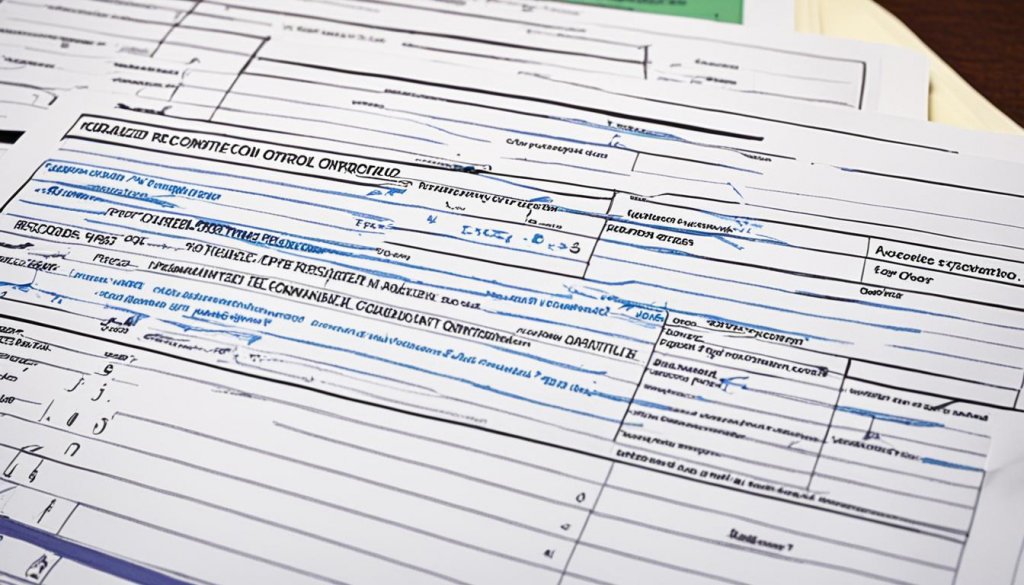I remember my early days in pest control when I first faced the challenge of regulations. It was a stressful morning when I got a call from a client with a big pest problem. I was ready to help, but I had to check my licenses and make sure I followed the rules. This experience made me focus on understanding the regulations in our field.
It’s crucial to follow the rules in pest control. It keeps my business safe from fines and legal trouble. It also keeps people and the environment safe. In this article, I’ll share five key tips to help pest control professionals like me stay legal and work well. Knowing the rules, getting the right licenses, keeping accurate records, and staying updated on changes are important for success in this field.

Key Takeaways
- Following the rules is key for the safety of workers and clients.
- Having the right licenses and certifications lowers legal risks in pest control.
- Keeping accurate records proves you follow the rules.
- Knowing how to report incidents and pesticides helps protect your business.
- Staying ahead of changes in rules keeps your business in line.
Overview of State and Federal Regulations Affecting the Pest Control Industry
Understanding state and federal regulations is key for those in the pest control industry. Each state has its own rules, requiring specific licenses and following pesticide use standards. These rules are enforced by departments of agriculture to ensure safe and effective pest control.
The Environmental Protection Agency (EPA) plays a big role on the federal level. It oversees the Federal Insecticide, Fungicide, and Rodenticide Act (FIFRA). This act covers pesticide registration, distribution, and use across the U.S. Pest control operators must understand these rules to follow pesticide use standards and stay compliant.
Knowing both state and federal laws helps pest control pros work within the law. Not following these rules can lead to big problems, affecting businesses and the industry’s reputation. Staying updated on regulations is crucial for success in this field.
Understanding Licensing and Certification Requirements for Pest Control Professionals
As a pest control pro, I need to know the rules for licensing and certification. These rules make sure we apply pesticides safely and improve our skills. They also help me stay in good standing and build trust with my clients.
Licensing Requirements for Pest Control Professionals
To work in pest control, I must get the right licenses, which change by state. In California, I need a pest control business license from local agencies. In Tennessee, I need to pass a test with a score of 70% and finish a training program like the National Pesticide Applicator Certification Program.
Licenses are important for following the law and keeping my job secure. Some licenses, like the Structural or Agricultural ones, have their own rules. It’s key to renew these licenses every year or quarter, depending on where I work.
Certification Programs and Continuing Education
Certification programs help me grow in my career. Getting certified means passing a test and finishing a training course, which varies by area. After getting certified, I must keep learning through continuing education.
This education keeps me up-to-date on safety and rules, helping my clients and boosting my reputation. By following these programs and education, I protect my career and open up more opportunities in pest control.
Maintaining Accurate and Complete Records: Documentation and Recordkeeping Guidelines
Keeping accurate records is key in pest control. It helps follow state and federal laws and keeps businesses safe from legal trouble. Certified private pesticide applicators must keep detailed records as the Federal Pesticide Recordkeeping Program demands. This program requires documenting pesticide use within 14 days, which is crucial for managing pests well.
Documentation Standards in Pest Control Operations
It’s important to keep pest control records accurate. You need to write down things like the product name, EPA number, how much was used, when it was applied, and where. You also need to include the type of crop, the size of the area, the person who applied it, and their certification number. Even spot treatments for weeds in small areas must be documented.
This info doesn’t need a special form, making it easier for businesses to follow. It helps with audits and makes sure everything is in order.
Best Practices for Recordkeeping
Using the best recordkeeping methods makes things run smoother and helps with following the rules. Digital pest control software, like Smart Service, makes keeping records better. These systems make it easy to document services, including photos and detailed reports.
Records are kept safely online, giving access only to those who should have it. This reduces the chance of losing data. Keeping pest control records for at least two years meets legal needs and helps in providing great service to customers.

Reporting Obligations: Incident Reporting, Pesticide Use Reporting, and Regulatory Notifications
In the world of pest control, knowing what you must report is key. It’s important for following the law and keeping everyone safe. By reporting incidents and pesticide use, we can lower health risks and inform the community. Regulatory notifications help keep the industry open and responsible.
Understanding Incident Reporting Requirements
When there’s pesticide exposure or spills, you must tell the right people right away. The Federal Insecticide, Fungicide, and Rodenticide Act (FIFRA) says you must share facts about any harm to the environment from pesticides. You must report things like pesticide in water or harm to people or animals quickly.
It’s crucial to make these reports accurate and on time. This helps manage risks in pest control work.
Pesticide Use Reporting: What You Need to Know
You must keep track of the pesticides you use and how much. These reports must follow the rules set by the government. If you find out something that could harm people or the environment, you must tell the authorities within 30 days.
This includes sharing scientific studies and results about how safe and effective pesticides are. Knowing the rules and deadlines helps me follow the law and keep the community safe.
Legal Responsibilities of Pest Control Professionals: Liability, Ethics, and Professional Conduct
For pest control pros, knowing the law is key. Liability covers damage from pesticides, public health risks, property damage, and environmental harm. Following the rules deeply shapes how they work. Each state has its own rules for using pesticides, so pros must follow these to stay out of trouble.
Understanding Liability in Pest Control Services
There are many ways liability can happen, like not knowing what pest you’re dealing with or using banned chemicals. These mistakes can put health and safety at risk and hurt the trust in pest control. For example, not storing pesticides right can lead to spills or contamination, causing legal issues. Using chemicals without thinking about the environment can also hurt other animals, leading to fines.
To avoid these problems, keeping detailed records is a must. This helps with being accountable and passing inspections.
Ethics and Professional Standards
Ethics are key in pest control. Being honest and clear with clients is important. I believe in following the rules for using pesticides and making sure clients know about the risks and benefits of treatments.
Using Integrated Pest Management (IPM) helps control pests without harming the environment. Sticking to these ethical standards builds trust with clients and keeps us in line with the law.
Compliance with Environmental Protection Laws and Regulations
As a pest control pro, I know how vital it is to follow environmental laws. These laws help keep our environment safe from pesticides’ harm. Following EPA standards is not just a must; it shows I care about public health and nature.
EPA Standards and Their Importance
The Environmental Protection Agency (EPA) sets strict rules for pesticides. These rules make sure products are safe and work well. Breaking these rules can lead to big fines—up to $5,000 per mistake for businesses.
Or, if it’s a serious mistake, I could face fines up to $25,000 and even jail time. It’s key to know these rules to protect my business and the planet.
State-Specific Environmental Regulations
I also need to keep up with state laws on the environment. In Tennessee, for instance, pest control pros must get certified to use certain pesticides. This makes sure they know how to use these products right. Not following these laws can lead to big trouble, like criminal charges.
Pest Control Services: Importance of Worker Safety and Health Regulations
Keeping workers safe in pest control is crucial. OSHA sets rules to protect technicians on the job. Following these rules makes the workplace safer and boosts employee happiness and job satisfaction. Studies show that OSHA 10 training cuts down on accidents, helping the whole company.
OSHA Standards in Pest Control
The Occupational Safety and Health Administration says pest control pros need to know about safety and health rules. Companies that get OSHA 10 certification see fewer worker compensation claims. This shows how important good safety training is. By focusing on worker safety, companies meet safety rules better and keep employees happy and on board.
Implementing Safety Practices for Pest Control Technicians
Good safety means using the right Personal Protective Equipment (PPE) and regular training. Safety training protects workers and shows a strong commitment to health rules. A safety-first culture builds trust with customers, leading to more customer loyalty. Safety practices help lower health risks from pests, reduce chemical exposure, and keep workers focused on their jobs.
Inspection and Enforcement Processes: Responding to Audits and Regulatory Inspections
In the pest control industry, it’s key to handle inspections and audits well to stay compliant. Being prepared helps a lot during inspections. Doing regular checks on ourselves makes sure we follow the rules and meet standards.
Preparing for Regulatory Inspections
Getting ready for inspections means knowing what’s expected by federal and state rules. The U.S. Environmental Protection Agency lists important areas to focus on. These include checks on pest control workers and how we use our products.
By understanding these areas, my team and I can get ready and make sure we’re good to go before inspectors come.
Best Practices for Responding to Audits
When audits happen, working together and being open is key. Talking clearly with inspectors shows we care about following the rules. Quickly fixing any problems can prevent fines.
Using best practices makes audits a chance to learn. Putting compliance first helps us run better and improves our reputation in the industry.
Updates and Changes to Regulatory Frameworks: Staying Informed and Adapting
It’s vital to keep up with regulatory changes in the pest control industry. Regulations change often, so it’s key to follow compliance updates. I look to industry publications and professional groups for the latest on monitoring regulations. This helps me stay ahead and keep up with the law.

Monitoring Regulatory Changes in Pest Control
Keeping an eye on regulatory changes means watching updates from governing agencies. Groups like the Pest Management Regulatory Agency share news on new laws and best practices. I get the latest by subscribing to newsletters and going to webinars. This keeps me informed and ready for changes.
Adapting Practices to Compliance Updates
When rules change, pest control methods need to too. I make sure to update my work to meet new standards. Using eco-friendly methods and tech for data helps a lot. As pests and environmental issues grow, keeping up with rules helps my business stay legal and support green pest control.
Conclusion
As I conclude this look into pest control, it’s clear that following the rules is key for success. Keeping accurate records and ensuring worker safety are crucial. These steps are linked to the rules set by authorities.
Staying updated on new rules and best practices helps us keep up in the industry. By being informed and careful, we offer top-notch services. This benefits our clients and helps create healthier communities.
Ignoring these rules can lead to big financial and reputation losses. So, knowing and following these regulations is vital.
In a world where pests can be a big health and property risk, focusing on compliance is more than just a legal must. It shows our commitment to quality service and the health of our customers. Adopting this approach benefits both your clients and your business.
See how FieldAx can transform your Field Operations.
Try it today! Book Demo
You are one click away from your customized FieldAx Demo!
FAQ
What are the key regulations I need to know for pest control services?
As a pest control pro, knowing state and federal rules is key. This includes pesticide use standards from state ag departments and the EPA. The EPA’s Federal Insecticide, Fungicide, and Rodenticide Act (FIFRA) is also important.
Why is licensing important for pest control professionals?
Licensing makes sure pest control pros know how to use pesticides safely and follow local laws. Most states need a license to use pesticides. This usually means passing a test.
How can I maintain compliance through accurate recordkeeping?
Keeping detailed records of pesticide use is crucial. This includes what you used, where, and how much. Using digital systems can make this easier and help with audits.
What are my reporting obligations in pest control operations?
You must report any pesticide incidents or spills right away. Many states also want you to report how much and what pesticides you use regularly.
What legal responsibilities do I have as a pest control operator?
You could be legally responsible for health problems or damage from pesticides. Following ethical standards and professional codes is important for your legal safety.
How do environmental protection laws impact pest control practices?
Following environmental laws, like those from the EPA, helps protect against pesticide harm. Your state might also have its own rules for your work.
What safety regulations should I follow for my team?
OSHA sets rules for health and safety in pest control. Make sure your team uses the right protective gear and gets regular training to stay safe.
How should I prepare for a regulatory inspection?
Get ready for inspections by doing regular checks and keeping good records. Work well with inspectors and fix any issues quickly to avoid fines.
What strategies can I use to stay updated on regulatory changes?
Keep up with new rules by reading industry news, joining professional groups, and taking more courses. This helps you change your methods as needed.
Author Bio
Co-Founder & CMO at Merfantz Technologies Pvt Ltd | Marketing Manager for FieldAx Field Service Software | Salesforce All-Star Ranger and Community Contributor | Salesforce Content Creation for Knowledge Sharing






